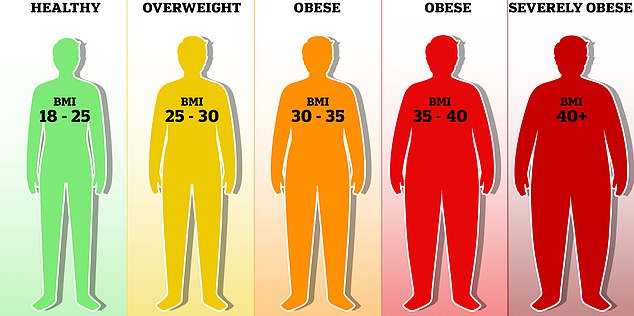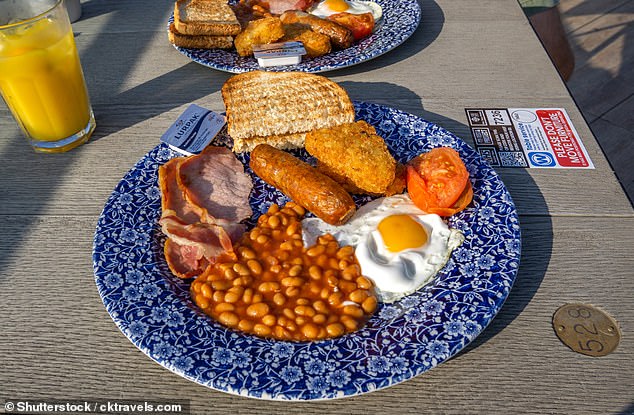Those looking to shed the extra pounds they piled on during the festive season should not skip breakfast, Spanish scientists suggested.
Instead, dieters should aim to consume 20 to 30 percent of their daily energy intake at the largest meal of the day.
That’s between 500 and 750 calories for men and between 400 and 600 for women.
In a study that followed the diet and health of nearly 400 adults for three years, scientists found that those who consumed this optimal amount of energy at breakfast time had a lower body mass index (BMI) than those who ate very little. or too much for breakfast.
While a full English provides too many calories, almost 900, a healthy jar of oats can provide very few, only 200.
But a McDonald’s Sausage and Egg McMuffin would be perfect for women at 423 calories.
In the study, published in The Journal of Nutrition, Health and AgingScientists compared the diet and health metrics of 383 adults between 55 and 75 years old in a hospital in Barcelona.
People who want to lose weight should not skip breakfast, according to a new Spanish study
All participants were obese and diagnosed with metabolic syndrome, a set of conditions such as high blood pressure and high cholesterol that increase the risk of heart problems and diabetes.
They were also participating in a clinical trial in which experts put them on a Mediterranean diet, rich in vegetables and whole grains, to try to help them lose weight.
The scientists tracked participants’ breakfast calorie intake at the beginning of the study, at two years, and then for the last time at the end of the study at three years.
Participants’ health data were collected at various points throughout the study.
Scientists found that those who ate too much or too little for breakfast had a BMI between 2 and 3.5 percent higher than those who ate the perfect amount.
The same was true for waist circumference, a measurement that indicates how much fat accumulates around the vital organs of the abdomen.
Those who ate too little or too much breakfast had waists that were 2 to 4 percent larger than those in the “sweet spot” zone.
Blood tests also showed that those who ate a little and a lot of breakfast had higher levels of fat in their blood, which is considered a risk factor for heart disease.

According to the BMI system, a score of 18.5 to 25 is healthy. A score of 25 to 29 counts as overweight, and more than 30 means that a person is obese, a stage at which the chances of getting sick skyrocket.
But it wasn’t just about calories, the scientists also analyzed the nutritional quality of the breakfasts the participants ate.
They found that those who ate unhealthy breakfasts (such as foods high in fat, salt and sugar, such as fried meats) also had a higher risk of poor health indicators, regardless of calorie content.
While a higher BMI and waist circumference makes sense for those who eat too much at breakfast, why those who ate less also had similar results seems contradictory at first glance.
The scientists suggested this had something to do with those who eat breakfast feeling fuller throughout the day and eating fewer calories overall because they snack less.
Professor Álvaro Hernáez, author of the study and expert in health sciences at the Ramon Llull University, stated: “Breakfast is the most important meal of the day, but what and how it is eaten matters.”
‘It is essential to eat controlled quantities (neither too much nor too little) and ensure a good nutritional composition.
‘Our data show that quality is associated with better outcomes in terms of cardiovascular risk factors. It is as important to have breakfast as it is to have a quality one.’
The study has some limitations that the authors acknowledge.
First, it’s observational, meaning that while the data suggested a link between breakfast calorie intake and health outcomes, the researchers couldn’t prove that was the case.
While the scientists tried to compensate for other factors, such as exercise level, participants reported that there could be another factor they didn’t account for that influenced the results.
What’s more, breakfast data was collected by asking participants questions, meaning the information was based on the participants’ collection and honesty.


